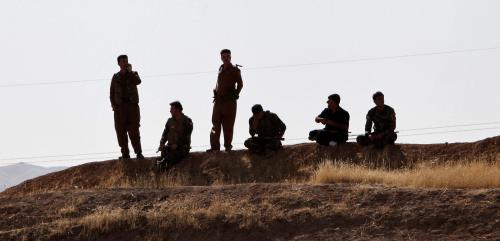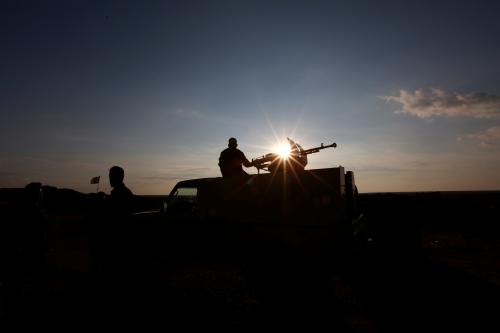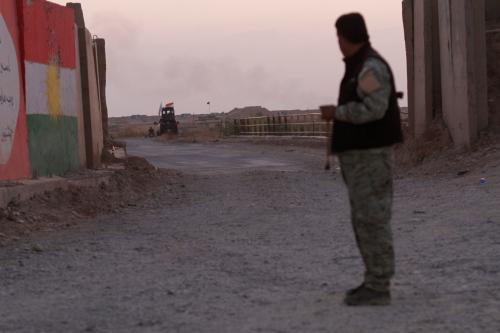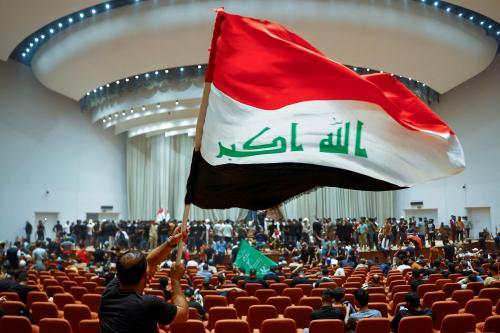A few weeks ago, we were having our weekly Middle East “what if” hypothetical conversation with a colleague, regarding possible scenarios in Iraq following the Kurdish independence referendum. We agreed that the Kurdish Regional Government (KRG) would have to settle for a symbolic victory without further action changing facts on the ground. We discussed possible Turkish and Iranian moves following the KRG’s announcement to put independence on hold, and the wild card of the disputed territories, mainly Kirkuk, and the challenges these would pose to Baghdad.
While there was little doubt Baghdad’s reaction would be fierce, we and our friend expressed confidence that since this was a dispute between two American allies, the Trump administration would keep the dispute under control, resolved through negotiations after the necessary Middle East muscles were flexed.
How wrong we were.
Following the recent events in Kirkuk, U.S. diplomacy failed to prevent a military confrontation between its two allies, the Iraqis and the Kurds, resulting in Iraqi Prime Minister Haider al-Abadi’s reassertion of federal control over the disputed territories. While Tehran has gained the upper hand, Kirkuk’s loss is symbolic of America’s declining influence in Iraq, and poses grave implications for U.S. allies and the future of the region. It is receiving far more attention among regional security professionals than is apparent from reporting here in the United States. Iran’s ability to take the lead and have a prevailing influence on Iraqi moves is a watershed moment in the region, with implications all over the Middle East.
Why should we care?
In past decades, American demands in such instances would carry a great deal of weight among its allies. Yet in this case, in America’s supposed “home court,” the attempt to assuage Baghdad’s reaction fell short of Iran’s heavyweight maneuvering, led by Qassem Suleimani, commander of the Iranian Revolutionary Guard’s Quds Force, who persuaded al-Abadi not only to reject American demands for a tempered response, but also to allow the notorious Shiite-dominated PMF (Popular Mobilization Forces) to support the Iraqi military in retaking positions in Kirkuk and the disputed territories. Despite the murky details surrounding Suleimani’s coordination, it is clear that the Iranians asserted pressure on the PUK (Patriotic Union of Kurdistan) leadership sitting in Sulaymaniyeh and Kirkuk. This resulted in the PUK Peshmerga standing down, forcing the hand of the KDP Peshmerga into a largely unchallenged retreat.
While reports claim the United States tried to broker a deal between Erbil and Baghdad, the Americans obviously failed to impose any red lines and failed to steer both sides in the right direction—a highly unusual outcome when dealing with two American allies. Iran’s adroit maneuvering outrivaled America’s diplomatic efforts and allowed Iran to score a triple victory: further distancing the PUK from its Kurdish rival the KDP (Kurdish Democratic Party), re-energizing PMF ascendancy in Iraq, and demonstrating an effective level of influence over Baghdad.
Masoud Barzani’s decision to step down as president of the KRG signals the extent of Kurdish defeat. While the United States is currently facilitating negotiations between Baghdad and Erbil over key border crossings and other various issues, and a ceasefire appears to be holding, this could have been avoided had the United States taken a harder line from the start.
This failure is striking in light of America’s long-standing relationship: Both Iraqi Prime Minister al-Abadi and the Kurdish leadership (PUK and KDP) are close American allies with whom the United States has significant leverage. There are reasons to believe this debacle also took many other Middle Eastern players by surprise, and its implications have fallen on deaf ears, as far as Washington’s public discourse is concerned.
Perspectives of allies and enemies
In the Kurdish camp, Barzani’s KDP feels betrayed once again by the United States. This perceived perfidy stings harsher in light of the U.S.-Kurdish alliance to defeat ISIS, with the Peshmerga working as America’s most effective ally fighting on the ground. Likewise, the PUK is likely reassessing its relationship with its U.S. ally.
In the Iraqi camp, certain leaders may have learned that playing with Iran is more beneficial, particularly in light of the April 2018 parliamentary elections. The various Sunni factions are also asking themselves, once again, how much to rely on American loyalty, accompanied by a growing level of frustration in the face of increasing Shiite influence over Baghdad. Sunni frustration over prejudicial power-sharing has proved crucial to Iraq’s tenuous unity and stability; upsetting this balance can quickly bubble over into chaos and radical insurgency.
All the while, neighboring Middle Eastern countries are keeping score. The message they are deciphering is one of a waning American determination or perhaps worse, an inability to play a major role in balancing or maintaining order in the area (apart from only one overriding goal: successfully defeating ISIS).
Iran’s natural interest in Iraq cannot be denied, due to their shared border and overlapping history. Nevertheless, Iran’s Shiite-centric narrative stokes sectarian animosity with proven lethal results. Iran’s direct confrontation with U.S. diplomatic efforts in Kirkuk should not be underestimated—conclusions Tehran draws from this episode could lead to an even more destructive level of interference in future U.S. interests in Iraq. While Washington’s strategic desire is for a unified Iraq under the leadership of al-Abadi, the handling of the Kirkuk crisis undermines this policy, as it increases both Kurdish and Sunni frustrations and proves that disputes are settled on the battlefield, rather than at the negotiating table. From indispensably mediating between factions on the ground, attempting to secure corridors across Iraq and Syria, and expanding the PMF’s role in securing vital territory, Iran’s goals and accomplishments are clear, while U.S. gains remain considerably more opaque.
Last but not least, Russia lost no time securing an economic deal with Iraq, giving Russian contractors in Iraq greater leeway in their energy operations, trading loans for the right to build and operate oil and gas fields. They also launched a pilot program to explore oil options in Iraqi Kurdistan. Some in Baghdad look to Moscow to hedge against U.S. interference. The United States, however, cannot afford to yield to Russia any more symbolic victories in the Middle East without jeopardizing their own strategic goals.
Speak softly and carry a big stick
In the current Middle East reality where events unfold at a rapid clip, there is little time to react and even less room for indecisiveness. The slow pace of the U.S. response to recent events in Iraq and Iraqi Kurdistan have limited Washington’s strategic options. Still, reactions that contradict U.S. interests and may jeopardize its strategy should be met with a decisive and determined response, especially when relevant parties may interpret the results as weakness. Losing leverage and deterrence is a heavy price to pay, particularly when adversaries like Iran and Russia are quick to take advantage of any power vacuum, and regaining this leverage later will come at a higher price. Any opportunity to demonstrate determination should be seized.
Implications for U.S. ambivalence are not limited to the Middle East—world players in other theaters are attempting to decipher America’s new strategy, gauging her appetite for risk in order to calculate potential moves, and identifying areas in which to challenge the United States.
Finally, as was proven time and again, correcting a mess can prove to be far pricier than preventing one in the first place. Averting Iran’s successful orchestration in the Kirkuk case would have likely been far easier than what it will now take to enervate their new position of strength. The scorecard will only be revealed following Iraq’s upcoming parliamentary elections next spring.










Commentary
Dropping the ball in Kirkuk
November 3, 2017